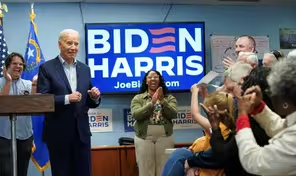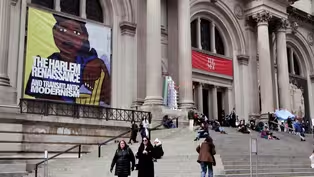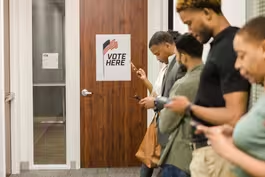
'Exvangelicals' explores why many are leaving the church
Clip: 3/19/2024 | 7m 22sVideo has Closed Captions
New book 'The Exvangelicals' explores why many Americans are leaving the church
Evangelicals are an important, and influential, voting bloc for the Republican party, particularly in presidential elections. But NPR’s Sarah McCammon found many Americans are leaving the church and explores why in her new book, “The Exvangelicals.” McCammon joined Geoff Bennett to discuss what she discovered.
Problems playing video? | Closed Captioning Feedback
Problems playing video? | Closed Captioning Feedback
Major corporate funding for the PBS News Hour is provided by BDO, BNSF, Consumer Cellular, American Cruise Lines, and Raymond James. Funding for the PBS NewsHour Weekend is provided by...

'Exvangelicals' explores why many are leaving the church
Clip: 3/19/2024 | 7m 22sVideo has Closed Captions
Evangelicals are an important, and influential, voting bloc for the Republican party, particularly in presidential elections. But NPR’s Sarah McCammon found many Americans are leaving the church and explores why in her new book, “The Exvangelicals.” McCammon joined Geoff Bennett to discuss what she discovered.
Problems playing video? | Closed Captioning Feedback
How to Watch PBS News Hour
PBS News Hour is available to stream on pbs.org and the free PBS App, available on iPhone, Apple TV, Android TV, Android smartphones, Amazon Fire TV, Amazon Fire Tablet, Roku, Samsung Smart TV, and Vizio.
Providing Support for PBS.org
Learn Moreabout PBS online sponsorshipGEOFF BENNETT: In her new book, NPR political correspondent Sarah McCammon takes a closer look at a growing movement away from the white evangelical church.
Her perspective is part investigative and entirely personal.
I spoke with her recently about the book, "The Exvangelicals: Loving, Living, and Leaving the White Evangelical Church."
Sarah McCammon, welcome to the "NewsHour."
SARAH MCCAMMON, Author, "The Exvangelicals: Loving, Living, and Leaving the White Evangelical Church": Thanks so much for having me.
GEOFF BENNETT: So let's start with the definition of the term, exvangelical.
It is what it sounds like, someone who left the church or left the faith, or, in some cases, both.
SARAH MCCAMMON: Yes, essentially, it means somebody who used to be evangelical and now, for whatever reason, does not identify that way.
And that can mean a lot of different things.
It can mean not religious at all.
It can mean still very deeply religious, but not identifying with the evangelical term.
And it's something I came across in my reporting.
I discovered that, as the label evangelical has become increasingly, in many people's minds, a political one, rather than a spiritual or theological one, it's a term that some people are conscientiously moving away from.
GEOFF BENNETT: And you were raised in a deeply evangelical family in the Midwest, taught to fear God, not to question the faith.
How did that come to define your world view and ultimately come into conflict as you got older?
SARAH MCCAMMON: The world I grew up in was really entirely surrounded by evangelical teachings, ideas, books, media, magazines.
And I think anyone who grew up evangelical in the '80s and '90s or a little bit after will recognize that.
It was a carefully constructed world that presented a very specific world view.
And, for me, that meant that our family, our community, we were called upon to share our faith with other people.
It also had political implications.
And one of the most challenging things for me about that was the idea that everyone who disagreed with us was not part of the family, not part of the fold.
As a child, it was really impressed upon me that it was really important to view the world in this specific way.
But, as I got older, I struggled to do that.
GEOFF BENNETT: In the book you explore the many reasons why people leave the evangelical church.
What are some common threads?
SARAH MCCAMMON: There are a lot of common themes.
And I think the biggest unifying theme is a sense that the world you're presented with in the evangelical community doesn't always align with the world that you discover as you learn and grow and maybe get to know people who are different.
But some of those themes are -- sometimes, it's sexuality.
Sometimes, it's politics.
Sometimes, it's science, the view of science.
One of the things that I was taught growing up and a lot of evangelical kids are is that the Earth is 6,000 to 10,000 years old, and that one of the reasons that so many scientists believe in evolution is because it's a way to avoid acknowledging God.
And, as I got older, I discovered that most people didn't see the world that way, that there were pieces of -- really, pieces of knowledge that were missing from my childhood education.
And I also discovered that isn't the only way to see the world, that many people believe in God and believe in science.
And so it's those sources of cognitive dissonance, I think, that drive a lot of people to reframe, question, reform their faith.
GEOFF BENNETT: It's an interesting point, because there is this notion that people who leave the church are somehow anti-religion or anti-Christian.
But what do you make of that?
SARAH MCCAMMON: I don't think it's true.
I mean, first of all, many of the people I have met and talked to in the process of writing this book had to think deeply about their faith, wanted to think deeply about it because they cared about it.
But it wasn't about hating the church or rejecting the church.
Now, certainly, people -- some people find their way out of the church, but a lot of people I talk to are trying to find some connection to spirituality, whether it's Christianity or something else, even after life in an evangelical environment.
GEOFF BENNETT: Moving on, it strikes me, can be fraught.
I mean, what are exvangelicals leaving behind when their families and their communities are still tied to the church?
SARAH MCCAMMON: It depends on the family and the community, and I think some families are more accepting than others.
A lot of people I talk to for this book have had to set very careful boundaries with the things they do and don't talk about with their loved ones.
And that can be really painful and isolating and alienating.
It can mean rejection.
It can mean a lot of distance from family members.
But it's interesting to see the -- sort of the compromises that people make or the ways that they navigate that tension.
GEOFF BENNETT: What do you hope readers take away from your book?
What conversations do you hope that this ignites?
SARAH MCCAMMON: Well, for people who grew up in the evangelical world or any sort of strict religious environment, to step away from it can be painful and can come at a cost.
And so I hope people who've had that experience that's often called deconstructing will feel seen and described and understood in -- when they read this book.
For people from outside the evangelical world who may have questions about it and even feel mystified about -- I get asked a lot, why do evangelicals believe the things they believe?
Why do they do the things they do?
I hope this will provide a little bit of insight and even empathy into what this experience is like.
GEOFF BENNETT: Do evangelicals -- do white evangelicals feel misunderstood?
Because there has been in the wider culture this sense of piling on, especially in the Trump era.
SARAH MCCAMMON: I think so, and that was something that I felt and heard growing up.
There was a sense that -- it was interesting, because I think I grew up with the impression that we were sort of a small, kind of persecuted minority.
And that is a theme in many ways comes from the Bible, this idea that, if you follow God, you will be persecuted, just as Christ was persecuted.
What I didn't realize growing up as an evangelical kid was that I was part of a massive subculture, a giant movement that was close to one in four Americans during my adolescent years, at least, and that had a huge and outsized political influence on this country and still does in many ways.
So that sense of embattlement and persecution, I think a lot of it goes to the fact that white Christianity used to be the dominant culture really in this country.
And it's increasingly on the decline, for a whole bunch of reasons, some of which just have to do with increasing diversity.
And on the one hand, the country is less white than it used to be.
It's also less religious.
And I should say many nonwhite Americans are very religious.
And so all of that means that there are a lot of crosscurrents happening within the American church right now and a lot of change.
And I think, for some white Christians in general who are used to feeling that their narrative was the dominant one, if it no longer is, that can feel like a threat, when it's really just a change.
GEOFF BENNETT: Sarah McCammon.
The book is "The Exvangelicals: Loving, Living, and Leaving the White Evangelical Church."
Thanks so much for coming in.
Great conversation.
I appreciate it.
SARAH MCCAMMON: Thanks, Geoff.
Biden adviser on plans to counter spiking cost of housing
Video has Closed Captions
Clip: 3/19/2024 | 5m 33s | White House adviser discusses Biden's plans to counter spiking cost of housing (5m 33s)
Climate researcher on record rise in ocean temperatures
Video has Closed Captions
Clip: 3/19/2024 | 6m 23s | Climate researcher on what's causing the record rise in ocean temperatures (6m 23s)
Experts warn of 'imminent’ famine in Gaza
Video has Closed Captions
Clip: 3/19/2024 | 4m 59s | Experts warn of 'imminent’ famine in Gaza with lack of aid reaching Palestinians (4m 59s)
New exhibit celebrates impact of The Harlem Renaissance
Video has Closed Captions
Clip: 3/19/2024 | 6m 45s | The Met's new exhibit celebrates impact and legacy of The Harlem Renaissance (6m 45s)
Social media influencers playing role in election
Video has Closed Captions
Clip: 3/19/2024 | 5m 56s | How social media influencers are playing a role in the presidential election (5m 56s)
Supreme Court clears way for Texas to deport migrants
Video has Closed Captions
Clip: 3/19/2024 | 2m 37s | Supreme Court clears way for Texas police to arrest and deport migrants (2m 37s)
What's next for Israel as Netanyahu, Biden rift widens
Video has Closed Captions
Clip: 3/19/2024 | 6m 52s | What's next for Israel and war in Gaza as rift between Netanyahu and Biden widens (6m 52s)
Providing Support for PBS.org
Learn Moreabout PBS online sponsorshipSupport for PBS provided by:
Major corporate funding for the PBS News Hour is provided by BDO, BNSF, Consumer Cellular, American Cruise Lines, and Raymond James. Funding for the PBS NewsHour Weekend is provided by...


















